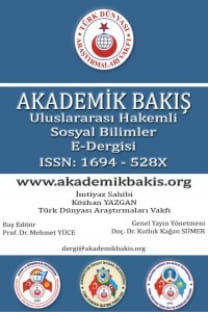KAZAKİSTAN LOJİSTİK SEKTÖRÜ VE SEKTÖR PAYDAŞLARININ LOJİSTİK KÖY İLE İLGİLİ GÖRÜŞLERİNİN SWOT ANALİZİ İLE DEĞERLENDİRİLMESİ
Lojistik köyler; ticari operasyonlarda hem ulusal hem de uluslararası bütünleşik lojistik ile ilgili tüm faaliyetlerin çeşitli işletmeler tarafından yürütüldüğü, iyi planlanmış ve yönetilen, yük taşımalarıyla ilişkili faaliyetlerin kümelendiği ortak alanlardır. Köy, üs, merkez gibi değişik şekillerde tanımlanan bu yerler küreselleşmenin de etkisiyle sürekli kendini yenilemekte ve sektöre ve yeni teknolojiler ile daha kaliteli hizmet sunmaktadırlar. Lojistik köylerin kurulumunda dikkat edilen en önemli konu - ticari faaliyetlerin yoğun olduğu, taşımacılık modlarına yakın yük dağıtım noktalarını bütünleştiren bir noktada konumlanma zorunluluğudur. Bu bağlamda coğrafi konumu itibariyle tarihi İpek Yolu gibi önemli ticaret yollarının üzerinde bulunan, günümüzde de kara, demir ve havayollarında birçok uluslararası transit koridorunu barındıran Kazakistan lojistik potansiyeli ile incelenmeye değerdir. Kazakistan, zengin yer altı kaynakları ve ipek yolu gibi önemli bir konumda bulunması nedeniyle ciddi bir ihracat ve lojistik potansiyele sahiptir. Bu denli ticari avantaja sahip olmasına karşın sadece lojistik köy/üs/merkez değil, lojistik altyapıda dahi henüz emekleme dönemini yaşamaktadır. «Kazakistan lojistik sektörü ve sektör paydaşlarının lojistik köy ile ilgili görüşlerinin SWOT analizi ile değerlendirilmesi», isimli tez çalışmasında, Kazakistanın böylesine stratejik bir noktada olmasına karşın lojistik anlamda beklentileri karşılayamaması irdelenmeye çalışılmıştır. Tez çalışmasının, birinci bölümünde lojistik kavramı, gelişimi, taşımacılık modları, uluslararası ticaret ve lojistikte yeni uygulamalar hakkında genel bilgi verilmiştir. İkinci bölümde lojistik merkez ve köy kavramları ele alınmış, dünyadan ve Türkiyeden örnekler verilmiş ve Kazakistanın ticaret hacmi ile ülkedeki lojistik sektörünün geçmişi, bugünü ve geleceği mercek altına alınmıştır. Son bölümde ise lojistik köy/üs/merkez kurulması açısından Kazakistanın potansiyeline yönelik bir SWOT analizi yapılmıştır. Sonuç olarak, Kazakistanda lojistik sektörünün kara ve demiryolu taşımacılığı ağırlıklı çalıştığı, PL (Parti Lojistik) uygulamalarının ise henüz başlangıç düzeyinde olduğu vurgulanmıştır. Bu noktada Kazakistanda intermodal taşımacılık ve tam işlevli lojistik faaliyetler gerektiren lojistik köy/üs/merkez yapılanmaları için öncelikle taşımacılık altyapısının yenilenmesi ve geliştirilmesi gerektiği ortaya çıkmaktadır.
Anahtar Kelimeler:
Lojistik, Lojistik Merkez, Lojistik Köy, Taşımacılık, PL (Parti Lojistik) Uygulamaları, Uluslararası Transit Koridoru, Dış Ticaret, Lojistik Altyapı, Kazakistan
Freight villages are nicely planned and smoothly operated complexes where all types of activities in the area of freight handling are carried out by different companies providing all types of complex logistic services for both domestic and international trading operations. These logistic centers which are also known as villages, bases or parks keep on changing from time to time under the influence of globalization processes. Logistic centers are introducing into industry and providing services to consumers with a wider range of process solutions. Freight villages are located in areas with intense trade activities, in the intersections of cargo distribution systems and near transport junctions. Kazakhstan has been in the middle of intersections of many trade routes such as the Great Silk Road for a long history. In the present day, many international transit corridors go through Kazakhstan either by motorway, railway or airway. The presence of inexhaustible supplies of material wealth has made Kazakhstan to have a big export potential. In respect to this, a special attention of the logistic potential of Kazakhstan which is historically located in the node of important trade routes of the Great Silk Way and currently consolidates many international transit corridors that use motor, railway and air routes should be paid attention to. Due to the presence of infinite mineral reserves as well as being located in the center of the Great Silk Road, Kazakhstan has a great potential in export, transport and logistics. Notwithstanding to Kazakhstan possessing great potentials in trade, it is still making its initial steps in improving its freight villages or centers and its logistic infrastructure. This dissertation titled Evaluation of Logistic Sector of Kazakhstan and Opinions of Participants on Freight Village through SWOT Analysis presents an attempt to study the problem of the Kazakh logistic sector which regardless of its significant potential is unable to meet the needs of the logistic arena. In the first part of the study, the general information regarding to the definition, logistic development stages, type of transportation and innovations in the area of international trade and logistics is presented. The second part of the study clarifies definitions such as logistic centers and freight villages by providing examples from the all over the world and Turkey together with a detailed analysis of the Kazakhstani trade volume. An estimate is given to the past, present and future of the logistic industry of the country. The last part of the study presents a SWOT analysis of the potential development of Kazakhstan in the area of logistic centers and freight villages organization. The conclusion has highlighted that, basically, the logistic center of Kazakhstan includes automobiles and railway transportation and Part Logistics (PL) services are still in an infancy state of development. In this regard, in order to develop logistic centers and freight villages that can be able to provide intermodal transportation and logistics at a full range, it is necessary to modify the system and modernize the transport infrastructure.
Keywords:
Logistics, logistic centers, freight villages, cargo transportation, logistic PL services, international transit corridors, external trade, logistic infrastructures, Kazakhstan.,
- Başlangıç: 2004
- Yayıncı: Akademik Bakış
Sayıdaki Diğer Makaleler
KALİTE GÜVENCE SİSTEMLERİNE SAHİP OLMADA ETKEN FAKTÖRLER
SAĞLIK PERSONELİ ADAYLARININ GENETİĞİ DEĞİŞTİRİLMİŞ GIDALAR İLE İLGİLİ GÖRÜŞLERİ
NALAN BARBAROSOĞLUNUN HİKÂYELERİNDE BİÇİM OLARAK MELANKOLİ
TÜKETİCİLERİN SOSYAL SORUMLULUK BİLİNCİ DOĞRULTUSUNDA TERSİNE LOJİSTİĞE BAKIŞ AÇILARI
Elif Betül YALÇI, Nevin ALTUĞ, Yasemin Koldere AKIN
TÜRK MUHASEBE SİSTEMİNİN GELİŞİMİNDE VERGİ ETKİSİ
BALKAN TÜRKLERİNİN YAKIN DÖNEM KAHRAMANLARI “YÜCELCİLER
GİRİŞİMCİLİK VE LİDERLİĞE FARKLI BİR BAKIŞ: GİRİŞİMCİ LİDERLİK
YAPAY SİNİR AĞLARIYLA KONTROL ŞEMALARINDA ÖRÜNTÜ TANIMA
Şebnem Koltan YILMAZ, M. Mustafa YÜCEL
Arda KARADAVUT, Gül Banu DUMAN
